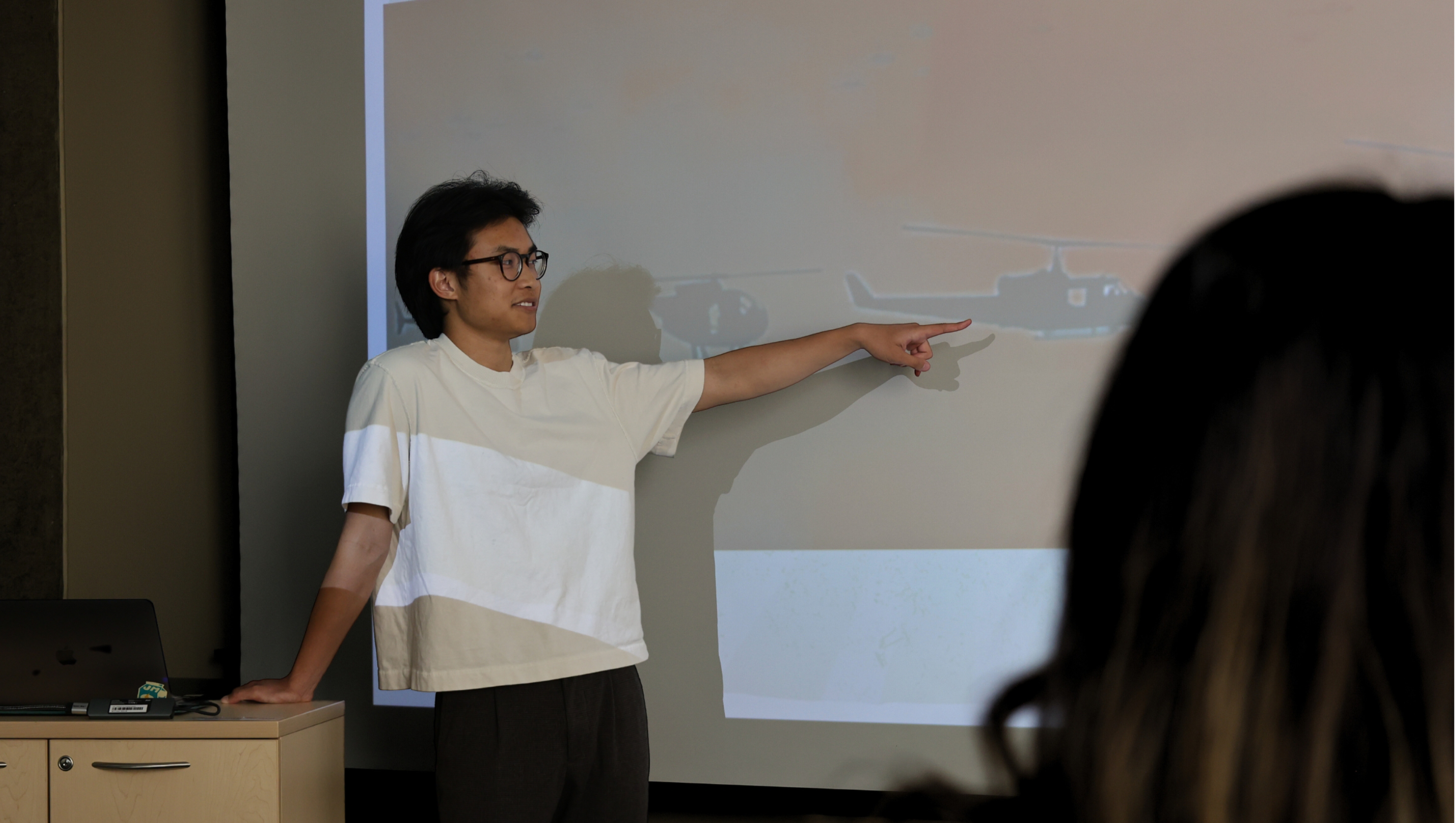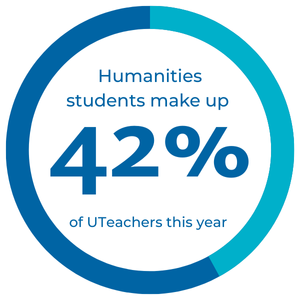
By Nikki Babri
In classrooms across UC Irvine’s campus, undergraduate instructors channel their academic interests into engaging learning environments: a history and gender and sexuality studies student examines how the hit musical “Hamilton” reshapes our understanding of America’s founding figures; a philosophy major explores the legal and political history of reproductive rights; an English major interprets Bob Dylan lyrics through literary frameworks; and a film and media studies major analyzes career women in television, from I Love Lucy to Parks and Recreation.

These scenes exemplify UCI’s UTeach program, a school-wide initiative where undergraduates design, develop and teach their own lower-division seminar courses to peers. Humanities students are consistently at the forefront, comprising nearly half of the 2025 UTeach cohort, a proportion that significantly exceeds their representation in UCI’s overall undergraduate population.
“Although we are proud to be a campus-wide program, humanities students definitely have a large presence in UTeach,” explains Theodore Martin, current UTeach faculty director and associate professor of English. “These students bring their experiences in humanities classrooms with them to UTeach, and make humanities-based approaches to learning and teaching an important part of the program.”
From concept to classroom
The year-long program guides undergraduate instructors through a comprehensive process of course development and pedagogical training. Students begin by developing course ideas with faculty mentors during summer and fall quarters, creating detailed syllabi and comprehensive weekly lesson plans.
During winter quarter, the instructors participate in a weekly pedagogy seminar led by Martin. To help students develop their own teaching personas, the seminar teaches essential skills from creating learning objectives to facilitating engaging discussions. Students perform intensive teaching demonstrations, receiving feedback from peers and faculty mentors before launching their courses in spring.

For Brian Nguyen, a senior double majoring in English and political science who teaches “Vietnam War Stories,” UTeach offered a unique opportunity to unite his academic interests with his personal identity. His course examines how the Vietnam War has been remembered, reimagined and retold across different communities and mediums to explore a central question: who gets to tell the story of war, and how?
“I saw it as an opportunity to bring together two parts of myself: my love for literature and my identity as a first-generation Vietnamese American student,” Nguyen explains. “I wanted to create a space where I could explore the cultural archive of the war – one that feels both deeply personal and intellectually rich.”
An interdisciplinary bridge
Started in 2007 as a student-led initiative and housed under the Division of Undergraduate Education since 2013, UTeach creates unique interactions between academic communities that rarely intersect otherwise.
“The program serves a crucial function in bringing students together from different parts of campus,” affirms Associate Professor of History and Film and Media Studies Allison Perlman, who directed UTeach from 2018 to 2023. “It brings together students who might otherwise never cross paths in their regular coursework.”
This cross-pollination enables a valuable exchange of ideas, with humanities-led courses often attracting STEM, business, social sciences and other majors eager to explore subjects outside their typical curriculum in an accessible, low-stakes environment.
The introductory nature of these classes makes them particularly valuable as entry points to new subjects. “Whether it’s a humanities student curious about computer science or a computer science student interested in film analysis, it’s a great way to explore unfamiliar disciplines without prior experience,” shares Martin.

The emphasis on accessibility and inclusion is particularly important, as UTeach instructors are taught to avoid presuming any prior knowledge of the subject by their students. When Katrina Hough ‘21 (B.A. English, B.S. neurobiology) designed her course, she intentionally chose texts that would resonate with students from all backgrounds.
“Literature and poetry can often feel inaccessible to people who are not humanities students, and I wanted people of other majors to see what it could be like to read works that were designed to be relatable,” she shares.
Learning through teaching
UTeach instructors often find the experience transformative, discovering that teaching others deepens their own understanding of their chosen subject while developing valuable professional skills.
“I’ve been surprised by just how much labor goes into planning a single class,” reflects Nguyen. “From curating texts and putting them in conversation, to designing slides and crafting discussion questions for each session. I often spend a lot more time than I initially set aside trying to create lessons that reflect my teaching philosophy.”
Hough hadn’t anticipated that the most challenging parts of teaching weren’t designing a syllabus and choosing texts; rather, they mirrored the struggles students themselves face, such as building confidence and embracing the inevitability of making mistakes along the way.
During the height of the COVID-19 pandemic, Hough taught “Heartbreak Narratives,” which explored themes of loss and grief through literature. Drawing from personal experience, she created a space where students could use reading and writing as tools for processing difficult emotions – a particularly timely approach during the isolation of remote learning.
UTeach also gives students an opportunity to put their theoretical understanding of texts, culture and communication into practice. For some, like Nguyen, it confirms their interest in teaching careers. For others, the program translates humanities skills into diverse career paths. Hough, set to attend the University of Michigan School of Medicine this fall, credits UTeach with developing crucial transferable skills. She learned to navigate uncertainty and manage discomfort, particularly during online teaching when she learned to embrace silence rather than rushing to fill it.
“This was such an important skill, not only for all my future teaching endeavors, but just for life,” she reflects. The confidence and empathy she developed through teaching directly supported her path to medicine, where she hopes to eventually incorporate education into her career.
Campus-wide impact and alumni success
UTeach draws instructors from across UCI’s academic spectrum, featuring STEM-focused offerings like “Ethics in the Emergency Room” and “History of Artificial Intelligence” to “The Physiology of Superheroes” and “Music and the Brain.” Students from every corner of campus bring their academic passions to life, making specialized knowledge accessible to classmates who might otherwise never explore these fields.
The program’s impact extends well beyond graduation. Among alumni from just 2016 and 2017, former UTeach instructors have built careers at global institutions and leading companies – from legal work at the United Nations Human Rights office to content design at Airbnb, HR leadership at NVIDIA and community engagement at the Metropolitan Museum of Art.
These diverse career paths demonstrate how teaching cultivates transferable skills that resonate in any setting. Whether pursuing their Ph.D. at an Ivy League university or launching an entrepreneurial venture, UTeach alumni continue to apply the communication, leadership and analytical abilities first developed when they stepped to the front of a UCI classroom.
“UTeach exemplifies UCI’s commitment to innovative education,” says Michael Dennin, Dean of the Division of Undergraduate Education and Vice Provost of Teaching and Learning. “By empowering undergraduates as educators, we foster skills that alumni carry throughout their careers while creating unique cross-disciplinary learning experiences that benefit our entire campus community.”
A student-centered approach
The UTeach program limits traditional lectures to just 15-20 minutes, instead prioritizing student-led discussions and hands-on activities. This approach reflects the foundational belief that meaningful learning happens through active engagement rather than passive listening.

This student-centered approach creates powerful learning moments. “I remember assigning a short story – Nam Le’s ‘Love and Honour and Pity and Pride and Compassion and Sacrifice’ – and the conversation just took off,” Nguyen recalls. “We ran out of time in class, and a group of students actually stayed afterward to keep discussing it.”
Through their shared journey of growth, discovery and flexibility, UTeach creates a tight-knit cohort of passionate students who support each other through the challenges of course creation and implementation.
Hough remains appreciative for the sense of community she received from working with her fellow UTeachers, faculty directors and mentors. “It was so easy to feel isolated in 2020-2021. Having the support of my fellow teachers meant the world to me during that time,” she reflects.
She adds, “UTeach made me see parts of myself I would not have had a glimpse of otherwise – I am forever grateful.”
Undergraduates from all majors are encouraged to apply for the 2025-26 UTeach cohort here.
Interested in reading more from the School of Humanities? Sign up for our monthly newsletter.
